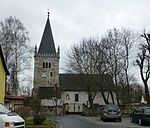Divi Blasii
Buildings and structures in Unstrut-Hainich-KreisGothic hall churches in GermanyLutheran churches converted from Roman CatholicismLutheran churches in ThuringiaMühlhausen ... and 1 more
Use British English from May 2022

Divi Blasii is a Gothic church in the Thuringian town of Mühlhausen, central Germany. Besides St Mary's, it is one of Mühlhausen's two principal churches. Divi Blasii is a three-aisle, cruciform hall church, situated on the Untermarkt (Lower Market) in the historical centre of the town. The elaborately designed display façade with tracery, pinnacles and a wheel window on the north side is located on an old trade route. Today, Divi Blasii is the central parish church of the Lutheran parish of Mühlhausen within the Protestant Church in Central Germany.
Excerpt from the Wikipedia article Divi Blasii (License: CC BY-SA 3.0, Authors, Images).Divi Blasii
Untermarkt,
Geographical coordinates (GPS) Address Nearby Places Show on map
Geographical coordinates (GPS)
| Latitude | Longitude |
|---|---|
| N 51.207222222222 ° | E 10.458333333333 ° |
Address
Untermarkt 36
99974
Thuringia, Germany
Open on Google Maps











